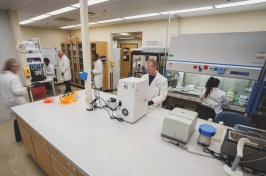UNH Researcher Receives Nearly $400,000 to Study ADHD

Diversity Hall of Fame Inductees for 2010 were honored recently at the UNH Diversity Banquet. From left to right: Mary Schuh, Class of 1998 and 2002 for her Ph.D.; Khaleelah Hilliard, Class of 2004; Bonnie Lai, 2004; Carol Tonge Mack, 2000; John Mabry, 2003; and Joelle Ruby Ryan, 2005. Not present for photo: Jared Sexton, Class of 1996.
DURHAM, N.H. - Most parents of teenagers can attest that their children can focus on activities that they like to do, such as video games, but not focus well in other situations, such as when completing homework. A new research project at the University of New Hampshire will look more closely at why this occurs and how drugs used to treat Attention Deficit Hyperactivity Disorder (ADHD) affect normal adolescent brains.
Jill McGaughy, associate professor of psychology, has received a two-year $399,000 grant from the National Institutes of Health to study the ability of normal adolescents to learn to focus their attention on one task and then shift their attention to another task. McGaughy and her team, who are using a rodent model, also will investigate the parts of the brain that control an adolescent's ability to stop engaging in activities that no longer yields positive consequences.
"We hope our work will lead to new insights in assessing attention in adolescents. We also hope that this work will lead to insights about when and how to treat these different ADHD-like symptoms, such as poor impulse control and an inability to re-direct attention," McGaughy said.
McGaughy and her research team will focus on the adolescent and adult prefrontal cortexes to try to determine whether their differences make it difficult for adolescents to modify their behavior. "There is a great deal of evidence to support the hypothesis that the prefrontal cortex of adolescents is not fully developed. This immaturity can lead to behavioral differences in adolescents and adults," McGaughy said.
The researchers also will look at the orbitofrontal cortex - the part of the brain that control one's ability to stop engaging in activity that no longer yields positive consequences. "Preliminary data from our lab and others suggest this brain region isn't fully mature in adolescents," she said.
By looking at the rate at which these two areas of the brain develop and the range of attention abilities of normal adolescents, the researchers hope to better understand how ADHD drugs impact the attention abilities of normal adolescents.
The University of New Hampshire, founded in 1866, is a world-class public research university with the feel of a New England liberal arts college. A land, sea, and space-grant university, UNH is the state's flagship public institution, enrolling more than 12,200 undergraduate and 2,200 graduate students.
- 30 -
Latest News
-
June 25, 2025
-
June 16, 2025
-
June 6, 2025
-
May 15, 2025
-
May 14, 2025
















































